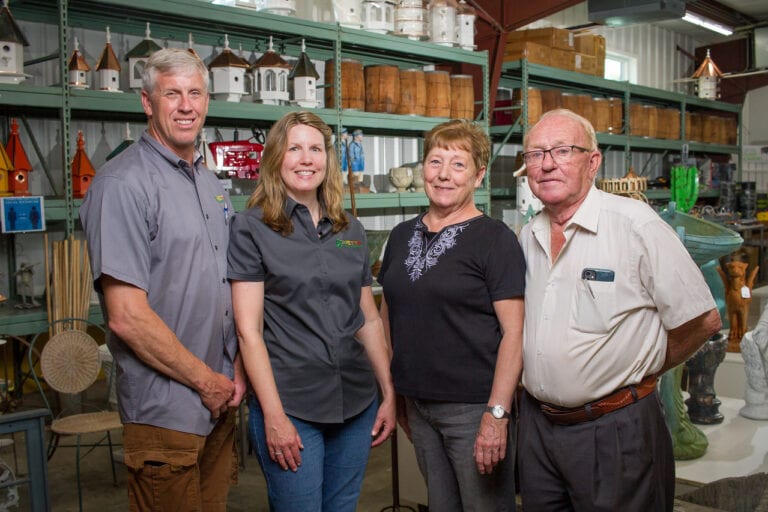The Original Hunter's Sale Barn
Meet Norman & Carol Hunter
It’s more than just a name. “Sonetta Community Market at Hunters” honors the legacy of Hunter’s Sale Barn, the business that operated here for nearly half a century. When Norman Hunter decided to purchase this property in 1975, he had no idea the business would become not only a local, but also a regional institution. Customers and vendors came from as far away as New York to buy and sell a wide variety of goods at the “Sale Barn,” as locals called it. We sat down with Norman and Carol Hunter to get the story behind this legendary place.
You can’t miss the red barn. Norman named this one-time home to the Eastern Shore Pony Club for the large red barn that served a farm here over one hundred years ago. A native of Oxford, Pennsylvania, Norman (Norm) Hunter conducted his first business in Maryland in the early 1960s, delivering milk door-to-door. After thirteen years in automotive sales, he decided to approach Harold Montgomery, owner of West Nottingham Sales, with an offer for the property. “I wanted to get into business for myself; I wanted to build a career for my family,” Norm recalls. With a $5,000 down payment, Mr. Hunter wasted no time cleaning up his new property. “The reputation of [the place] in the community was horrible,” he said. He hired a nightwatch and renovated some buildings, and a new clientele began to appear. He began selling livestock and horse tack on Monday evenings, and eggs and poultry from the barn. The Sale Barn grew as he built trust with his customers.
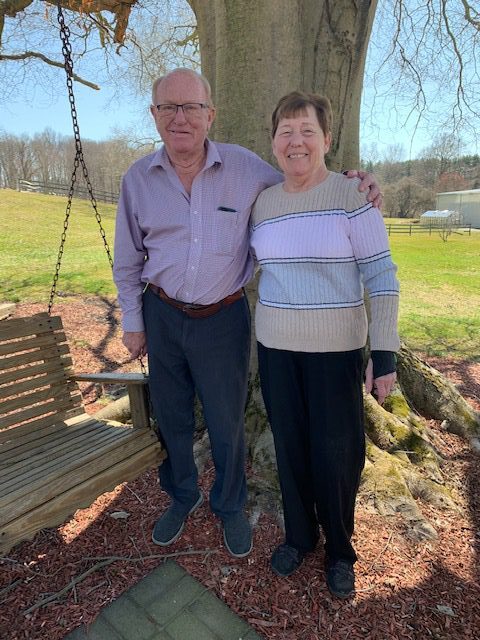
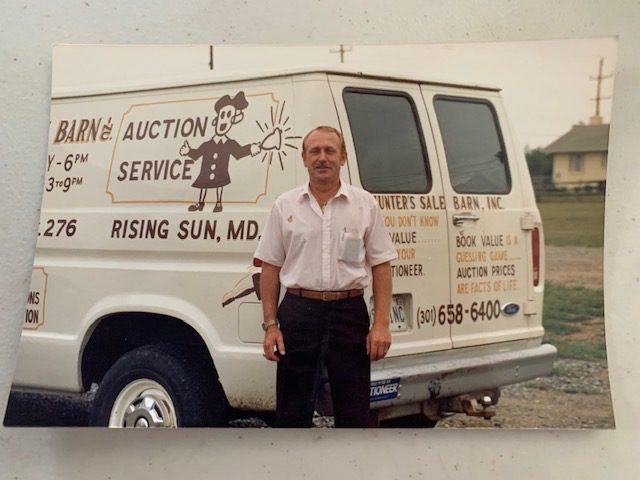
After getting his auctioneer’s license in 1978, Norm expanded the variety of goods he sold. A native of Conowingo, Carol, who married Norman in 1985, started out billing livestock sales at the auction in late 1975. She took on greater responsibility, collecting rent from flea market vendors and working in the furniture store that operated from the red barn. Carol, like Norm, graduated from the Certified Auctioneers Institute at Indiana University, then received additional training from Mendenhall Auctioneering School in North Carolina. She advises those beginning to, “Look for stuff people use and need.” The Hunters became experts at negotiating partnerships with big box stores to get items in demand. They purchased salvage goods – perfectly good items with damaged packaging – from locations around the mid-Atlantic. They successfully recruited a diverse group of vendors who set up tables for a day at a time at the Sale Barn, one stop in a sales circuit that sometimes started from points as far away as New York. At the height of the business, 175 vendors sold their goods at the market. The business also provided opportunities for local craftspeople, which included special weekend sales of shrubbery and decoy water fowl. Norman recalls auctioning up to $10,000 worth of decoys in a single hour to packed rooms. The Sale Barn also sold food to create a more robust experience for the buyers. The market hosted food trucks before food trucks were popular, an attraction that Sonetta plans to continue. Norman hired Bob and Lib Montgomery from Sue’s Restaurant, the beige building on the top of the hill, to cook and sell food from the barn. Several other restauranteurs leased the restaurant building over the years.
True to his entrepreneurial spirit, Norman also invested in estate sales. In 1980, local newspapers advertised his auction of the infamous Rodeo Earl Smith’s ranch in Perryville, requiring him to employ the Sherriff’s department around the clock for a week to keep looters away. Over 4,000 people attended the auction, and rare items like matching Colt .45 pistols from the historic 101 Ranch in Oklahoma fetched high sums.
Live auctions were the mainstay of the business operations at the Sale Barn. Norm and Carol fondly recall the presence of “Willie,” a talking, moving replica of Willie Nelson, that sat on the ramp of the auction building for years. Mr. Hunter also remembers the time his son Chris, only about eight years old, told him he would negotiate the price of some strawberries just fine by himself. Norman knew he had a natural ability after that. The Hunters have trained a lot of auctioneers over the years, but they say the most challenging part of auctioning was finding good “runners” to keep up with the fast pace of the auctioneer’s calling. Norm was president of the Auctioneer’s Association of Maryland in the late 1980s. He also served the community through his involvement with the Rising Sun Chamber of Commerce and the local Lion’s Club. Realizing that even locals were not very familiar with the town of Rising Sun, Norman started Sunfest in the early 1990s. The festival still occurs the first Saturday in June and showcases local businesses.
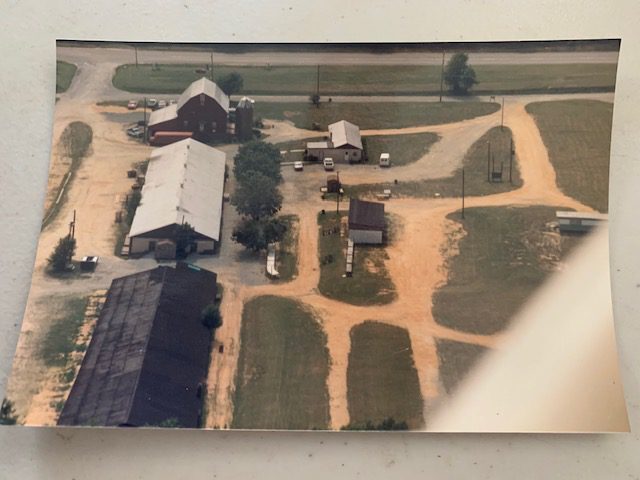
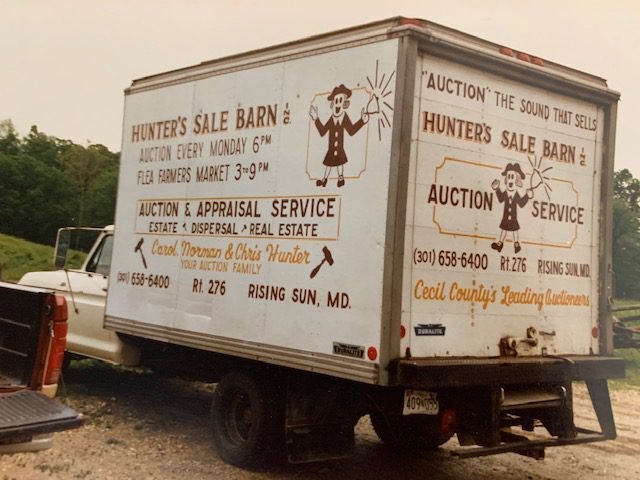
The Sale Barn had to roll with the punches over the years. One of the biggest threats to the business came in 1995 when sparks from burning apple cartons set fire to wood pallets leaning against the flea market and auction building. The biggest fire Cecil County had known to that point prompted emergency calls to fire departments as far away as Washington, DC. Norm remembers trying to remove the burning pallets on that frantic Easter Sunday, but not in time. Nevertheless, they conducted an auction the very next day outside the red barn. With the County’s encouragement, the Hunters rebuilt in less than a year. By the late 1990s, the development of e-commerce had prompted the Hunters to begin selling products online. Norm and Carol’s daughter Ronda helped to grow this new dimension of the business, focusing especially on clothing sales. She also managed the employees and set up the auctions with the help of her sister Angelica.
By the time Norm and Carol decided to retire, the Sale Barn was one of Cecil County’s most important businesses. Some called it “Hunter’s Mini-Mall.” “It’s been a good ride,” Norm says. “I came to the Sale Barn with a prayer and ended on a prayer.” He and Carol have enjoyed more time to garden, take day trips, and care for their grandchildren. “I’m a teacher one day a week,” Carol says, pointing to the highchair at the table. Norm occasionally conducts on-site auctions and appraisals in the area. He also has more time to maintain his car collection, which boasts a 1956 Ford Thunderbird and several Shelby Mustangs.
Some vendors continue to call the Sale Barn home, setting up their tables in the parking lot at Sonetta. Since Nick and Sue Thrappas purchased the property, they have received numerous inquiries from people who remember busy days at the Sale Barn. “We are looking to create a maker’s market for locally-produced items,” Nick says. “People are looking for good experiences, too. We want to create a good experience.” Sonetta will bring a fresh new chapter to the story Norm and Carol began almost half a century ago.
